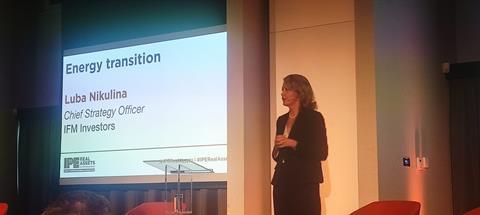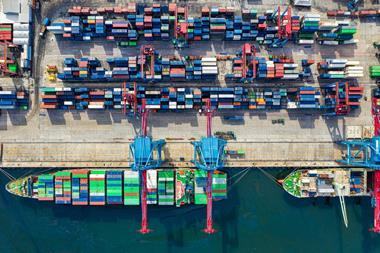Luba Nikulina, chief strategy officer at IFM Investors, has called on investors and governments to work together to ensure a smooth transition to a lower carbon economy.
Nikulina told delegates at the IPE Real Assets & Infrastructure Global Investor Conference & Awards 2023 that the energy transition and the systemic risks that climate change presents to investors cannot be dealt with by individual investors acting in isolation.
Investors and asset managers, together with governments, policymakers and regulators, need to work collectively to navigate energy-transition challenges, she said.
“You cannot really stock-pick your way out of systemic risk,” she said. “You cannot diversify them. We are all affected by it. And for long-term investors in particular, all your assets are going to be affected if we are not going to solve this climate-change problem together.”
Nikulina drew parallels with IFM Investors, which was founded in the 1990s by a group of Australian pension funds as a collective vehicle to invest in infrastructure, as capital markets were not providing an efficient mechanism to do so.
“This collective action by Australian pension funds helped solve a systemic problem in Australia and it has been very successful,” she said. “After 30 years we have $140bn (€131bn) assets under management and more than 650 clients, most of them pension funds around the world.”

However, Nikulina noted that IFM’s assets, which include critical infrastructure like toll roads, ports, airports, and oil and gas pipelines, are very carbon intensive.
That said, IFM has been “thinking about how do we diversify our sources of revenues and started investing significantly in the alternative energy, and this has started gaining momentum”.
For instance, the firm has assigned financing for a project that will become the second-largest solar project in the US in the Chicago area. The project, which will create more than 400 jobs there, will also help the city of Chicago deliver on its commitment to get all of its energy from renewable sources by 2025, Nikulina said.
Nikulina referenced the Glasgow Financial Alliance for Net Zero, of which IFM is a member, formed three years ago as an industry-wide movement created through collaborations.
She also praised the Inflation Reduction Act in the US, calling it “probably the most effective piece of climate legislation that has ever been created”, adding that it has started generating change in the economy.
“We know that the UK is looking to respond to this piece of legislation,” she said, adding that Australia also recently created the Net Zero Agency.
Nikulina also called on private capital, superannuation funds, businesses and trade unions to help figure out how to move to a low-carbon future in a socially responsible way.
“We need to find a way to get people in the room together and to think how to do it collectively,” she said.
“We have the capital that wants to invest. It just needs to work collectively, including governments, policymakers and regulators to ensure that this transmission mechanism works efficiently.”
Investors and governments have a key role to play in this transition. By working together, they can help to ensure that it is smooth and orderly and that it benefits all of society.
To read the latest edition of the latest IPE Real Assets magazine click here.























